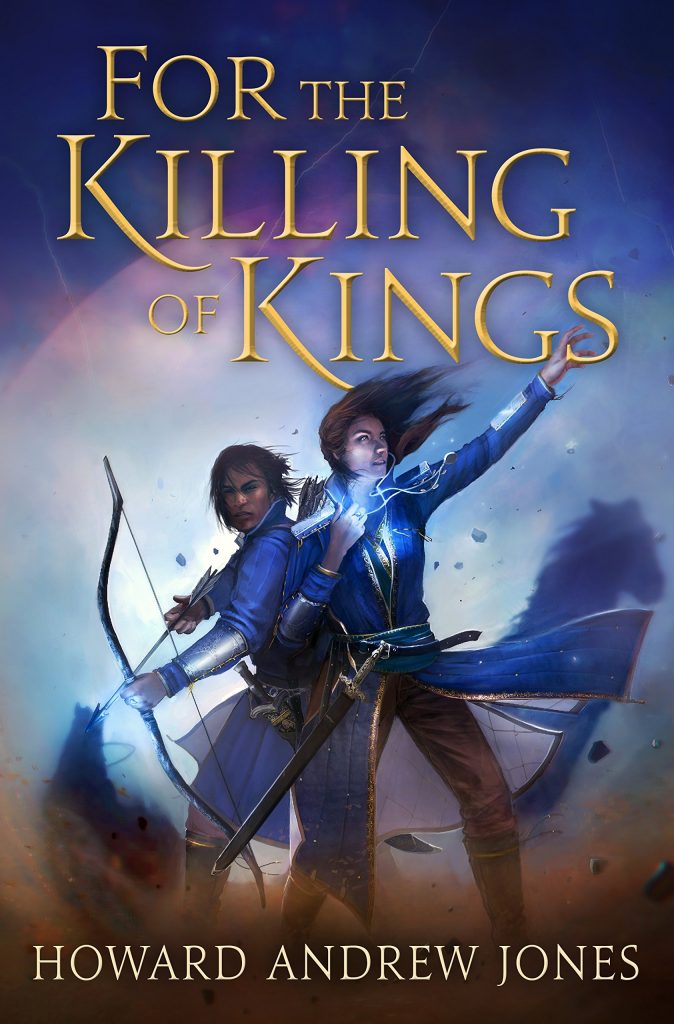World-building is obviously a crucial element to writing a compelling fantasy novel. If this construction is done too heavily, passages can drag on, while too little detail can keep the work from truly leaving a mark on the reader.
Howard Andrew Jones (who we’ve interviewed not once, but twice!) strikes that balance masterfully in For the Killing of Kings, the first book of an expected series. The book drops the reader right at the moment when a scandal in the Allied Realms begins. This controversy involves the legendary weapon of the most famous commander of the vaunted Altenerai Corps, N’lahr. Jones doesn’t even let two pages pass before the reader is invited into the discovery that something is wrong with this magic-infused sword, and it is that problem that carries the book’s action from start to finish.
For the Killing of Kings: Right Down to Business

Because no time is wasted in getting directly down to the business of the novel, there is no time for lofty descriptions of royal furnishings and breath-taking landscape. Instead, readers are provided with descriptions about the key locations in the Realms, both firm land-based regions and ethereal wilds, through the experiences of several third-person focal characters. If a building or landscape feature is described in detail, it is because Jones intends to use that feature to develop the story he’s telling. This writing style makes For the Killing of Kings a quick yet immersive read. We learn about elements of the realm – from the dress and lore of the mighty Altenerai to the architecture of the city of Darassus – as those aspects would naturally draw the attention of whichever character currently has the “lead” for that chapter. This allows for some nice surprises within the plot, and it also breaks the true world-building into easily digestible chunks.
Because Jones consistently leaves parts of his created world undeveloped until they are needed, he’s able to pull off several notable plot twists that keep the reader engaged. Politics in the Allied Realms – as in the real world – aren’t what they seem on the surface, and we haven’t even fully explored those depths at book’s end. What’s more is that Jones’ world-building style makes these twists few organic instead of forced by the writer.
For the Killing of Kings: Characterization, Magic, and Cuss Words!
The rotation of focal characters also gives the book a real “ensemble cast” feel. It’s at least somewhat evident that Elenai, an Altenerai squire that finds herself at the forefront of the book’s central scandal, would be considered the main character. Still, chapters devoted to several other figures give a much more dynamic, developed view of those characters than most novels provide.
As part of this characterization, Jones also uses language in an extremely effective manner. Personally, I feel a lot of authors – like stand-up comedians – use foul language like a 13-year-old who just realized he can swear as long as his parents aren’t around. Every character drops “f-bombs” like there are no other words available. Jones reserves such language for characters like Kyrkenall, a rogue Alten known almost as much for his drinking and irreverence as he is for his impressive battlefield prowess. As such, profanity becomes a character choice instead of coming off like the author wants desperately to sit at the “cool kids’ table.”
Another fascinating element of Jones’ handling of the world he’s creating is how he incorporates magic. Instead of being based in the pronunciation of spells, mixing of potions or bending of time and space, the magic of the Allied Realms is more a reading and controlling of the life force of the mage and beings around him or her. There are ways to enhance these magical efforts, but magic is largely an inherent skill that is to be practiced and honed, and readers get to learn about the rules and limitations of this skill alongside the book’s characters.
For the Killing of Kings: The First of the Ring-Sworn Trilogy
The one drawback to For the Killing of Kings is that what should have been the climax of the book’s action fell a little short to me. It was very clear that Jones wrote this book to be the first of a series, and that required an emphasis on what was still to be done over what had been accomplished.
Generally, this is something that would be a huge let-down for me, but instead, it was just a minor disappointment. Jones did such an excellent job of creating the Allied Realms and the characters that inhabit those regions that any disappointment is negated by excitement that more books are coming, and the story of the Altenerai will continue.
Read For the Killing of Kings when you get a chance, and then join me in waiting for the next book in the series.

